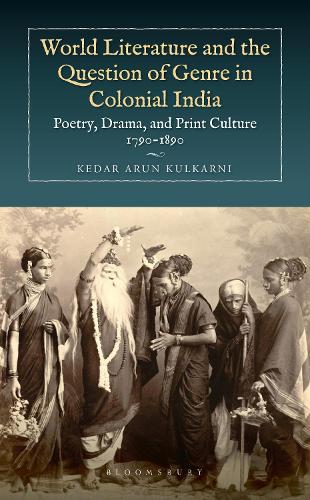
World Literature and the Question of Genre in Colonial India: Poetry, Drama, and Print Culture 1790-1890
(Hardback)
Publishing Details
World Literature and the Question of Genre in Colonial India: Poetry, Drama, and Print Culture 1790-1890
By (Author) Kedar Arun Kulkarni
Bloomsbury India
Bloomsbury Academic India
15th June 2022
India
Classifications
Professional and Scholarly
Non Fiction
Translation and language interpretation
Asian history
891.4609004
Physical Properties
Hardback
268
Width 140mm, Height 220mm, Spine 20mm
440g
Description
World Literature and the Question of Genre in Colonial India describes the way Marathi literary culture, entrenched in performative modes of production and reception, saw the germination of a robust, script-centric dramatic culture owing to colonial networks of literary exchange and the newfound, wide availability of print technology. The author demonstrates the upheaval that literary culture underwent as a new class of literati emerged: anthologists, critics, theatre makers, publishers and translators. These people participated in global conversations that left their mark on theory in the early twentieth century. Reading through archives and ephemera, Kedar Arun Kulkarni illustrates how literary cultures in colonised locales converged with and participated fully in key defining moments of world literature, but also diverged from them to create, simultaneously, a unique literary modernity.
Reviews
Kedar Arun Kulkarni (FLAME University, India): World Literature and the Question of Genre in Colonial India: Poetry, Drama and Print Culture, 17901890 is an ambitious intervention in the debates within postcolonial and world literature studies around the connections between vernacularisation and colonialism. Its focus on 18th- and 19th- century Marathi itinerant poets and performers, in dialogue with other vernacular literatures in India as well as the Anglophone tradition, shines light on an under-examined historical period and helps enrich a field dominated by studies of the post-1947 Anglophone novel in South Asia. -- American Comparative Literature Association, Helen Tartar First Book Subvention Grant Award Committee
Challenging us to reconsider the trajectories of both comparative literature and world literature through the modern literary history of Marathi, this book urges us to return to the polyglot audiences of colonial South Asia and consider anew questions of vernacularisation, performance, aesthetics and literary institutions beyond English. Insisting on how the disruption of colonisation was complexly transformative for local, multilingual literary cultures and helped to forge new notions of literature itself, Kulkarni raises many questions about the connections of language and nation, and the literary histories of the colony and postcolony with which scholars will need to grapple. -- Ayesha Ramachandran, Department of Comparative Literature, Yale University, USA
In this erudite and lively book, Kedar Arun Kulkarni asks, what might world literature really look like from the perspective of literary practices in Indian languages, beyond the dominant emphases on English, postcolonial studies or the novel His answer is not only a historically rich and theoretically astute study of 19th-century theatre and performance in Marathi literature from western India but also a provocative reconsideration of critical concepts such as genre, vernacular, multilingualism, orality and canonicity. Kulkarni passionately engages debates within the Anglophone academy and in the Marathi literary sphere, thus helping us reimagine the domains and possibilities of both Marathi literature as well as world literature. -- Prachi Deshpande, Centre for Studies in Social Science, India
Kedar Arun Kulkarni wants you to reconsider world literature and the Indian literary field in this bold study of colonial-era Marathi theatre, poetry and performance. Kulkarni deftly disentangles literature from reading, writing and even printing, while also decentring the Orientalist classics translated from Sanskrit, the dominance of Hindi as representative of the vernacular or the modern Indian English novel as paradigm of comparison common in the global literary sphere. In the process, Kulkarni provides a vision of how to conceptualise genre within a literary ecology that linked Marathi to global flows of critical thought in the 19th century in a far more capacious way than is understood by scholars today. In the process, Kulkarni gives us his vision of how literary studies might be transformed by attention to more heterogeneous worlds of language and medium. -- Christian Lee Novetzke, Jackson School of International Studies, University of Washington, USA
Kedar Arun Kulkarnis study is quite extraordinary. He reflects on and redefines the concept of literature in colonial India in order to showcase literary works in the Marathi language. In doing so, his study charts transformations in performance and poetic genres with the advent of print culture in colonial India. This book offers completely new insights into literature, theatre and performance under colonialism. -- Erika Fischer-Lichte, Department of Theatre and Performance Studies, Freie Universitt, Germany
Author Bio
Kedar A. Kulkarni is a literary historian whose current work focuses on the 18th-20th centuries, on Marathi Literature within a global context. His articles and essays have appeared in the Economic and Political Weekly, Asian Theatre Journal, South Asian History and Culture, Scroll.in, and other venues.
